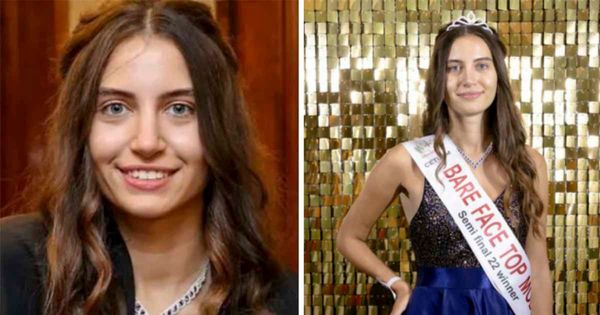
In a historic move, twenty-year-old Melisa Raouf has become the first contestant in the 94-year history of the Miss England pageant to compete without wearing any makeup. By embracing her natural beauty, Raouf aims to inspire other women to feel confident and comfortable in their own skin.
Raouf’s decision to go makeup-free stems from her desire to challenge the beauty standards perpetuated by social media. She believes that many girls and women feel pressured to wear makeup and hide their true selves. According to Raouf, “Our flaws make us who we are and that’s what makes every individual unique. I think people should love and embrace their flaws and blemishes, as we know real beauty lies within simplicity.”
While the Miss England pageant traditionally includes a bare-face round, Raouf is the first contestant to voluntarily participate without any makeup. She describes the experience as both daunting and amazing, and she plans to continue competing without makeup in the finals as well.
Raouf’s journey towards self-acceptance began when she started wearing makeup at a young age due to a lack of confidence in her appearance. However, she has now come to realize that she is beautiful in her own skin and wants to share her true self with the world. By doing so, she hopes to empower others to feel more confident and secure in their own looks.
During the pageant, Raouf has received overwhelming support from other girls and women who have been inspired by her courage. She not only advocates for inner beauty but also raises awareness about youth mental health. Raouf promotes Papyrus, a UK organization working to prevent youth suicide, and aims to remove the beauty standards that negatively impact the mental health of young women.
The Miss England pageant organizer, Angie Beasley, introduced the bare-faced round in 2019 to counter the heavily-edited makeup-filled pictures submitted by contestants. She wanted to create an opportunity for participants to show their true selves without the need for makeup and filters. Beasley commends Raouf’s bravery, stating, “We wish her the best of luck in Miss England. She’s sending out an important message to young women.”
Body image is the perception a person has of their own body and how they feel about it. It is influenced by various factors, such as beliefs, experiences, and societal standards. Throughout history, beauty standards have evolved, and today, social media and popular culture play a significant role in shaping these standards. Unfortunately, they can also have a detrimental impact on people’s body image.
Negative body image occurs when a person feels dissatisfied with their appearance and constantly compares themselves to others. This can lead to feelings of inadequacy, self-monitoring behaviors, and discomfort with one’s own body. In extreme cases, a negative body image can contribute to mental health issues, unhealthy weight loss habits, and unnecessary surgeries.
Body image is influenced by societal messages, family, friends, and the media. The fashion and beauty industries often promote unrealistic and unattainable standards of beauty. Social media exacerbates the problem by showcasing only the most flattering images, causing individuals to develop unrealistic expectations of their own bodies. Research has shown a correlation between negative body image and disordered eating behaviors, particularly when exposed to content that focuses on appearances.
However, social media can also be a platform for promoting positive body image if used wisely. Taking breaks from social media and unfollowing accounts that evoke feelings of inadequacy and negativity can greatly improve one’s mindset. Instead, seek out uplifting accounts and communities that encourage self-acceptance. There are numerous body-positive Instagram accounts that challenge conventional beauty standards and offer tips on cultivating self-confidence.
A positive body image is characterized by feeling comfortable in one’s own skin and maintaining a healthy relationship with one’s body. It involves appreciating diverse notions of beauty, caring for the body in a healthy manner, and striving toward self-acceptance independent of external influences. It’s important to remember that body appreciation is possible regardless of one’s appearance. True beauty lies within, and embracing this truth can lead to a more fulfilling and contented life.



